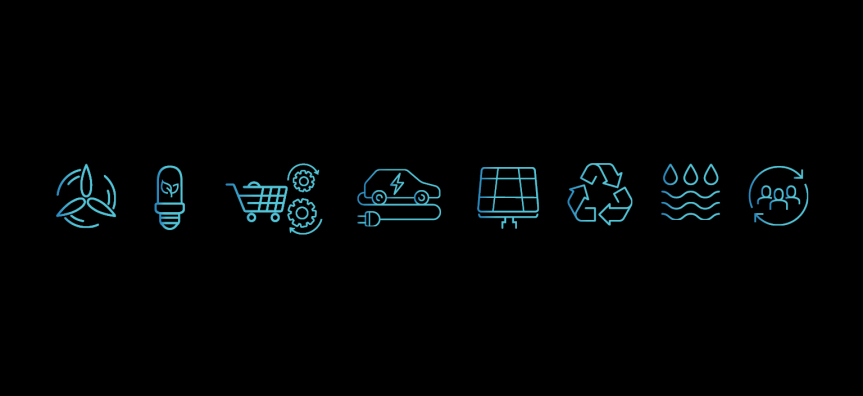
Has your business just started to implement a few sustainability initiatives?
Or maybe your business has a well-established sustainability program and has implemented many sustainability initiatives.
Find out which areas could be improved to continue on your journey towards net zero.
Follow the steps, under each topic area, to enable you to grow and achieve sustainability goals in a manner and pace that is best suited to you and your business needs. Further steps and resources may be released after review of the pilot period of the program.
Steps 'towards net zero'
1. Join and engage with the Sustainability Business Network (SBN)
- Complete this survey to join the SBN and connect with other members.
- Check out the members on the interactive Sustainability Business Network map. You can search via business name or topic of interest e.g. water savings.
2. Get some inspiration
- Read some case studies from local businesses that are kicking goals in their sustainability journey.
- Check out the Australian Sustainable Development Goals (SDGs) website - It has been developed by the Global Compact Network Australia (GCNA), with the support of the Australian Government. It is a live and ongoing platform to centralise and showcase action being taken across government, business, civil society and academia to advance the SDGs in the Australian context. Their 'Getting started' pages and resources are an introduction to the SDGs and how they might be applied; the benefits of incorporating them into business, case studies and practical guidance.
3. Implement a Sustainability Policy
- Use our Sustainability Policy template as a starting point to put a statement together.
- Outline what your sustainability goals and objectives are (get your staff involved in this process).
4. Self-assessment: What stage are you currently at?
Assess your current status on your sustainability journey.
- Use the ‘How to guides’ and ‘Self-assessment Checklists’ to self-assess how your business is currently tracking with sustainability measures.
- Identify the areas that you'd like to improve on within the business and the actions you are going to take.
5. Implement a Sustainability Action Plan
Identify actions required and project(s) to implement:
- Using the actions you have previously identified in the 'self-assessment checklists' under 'targets' you can now create your own tailored 'Sustainability Action Plan'; set timescales for each action and add in tracking to monitor your progress.
- Utilise other resources such as Council's Swap for Good program and government-funded schemes.
- Don't forget to regularly review your action plan to monitor your progress.
At any stage in the process you can contact Council officers for assistance along the way.
6. Next Steps - Carbon accounting - calculating your current carbon footprint
If you want to be fully accredited as a carbon neutral or net zero business you need to complete your carbon accounting by calculate the amount of greenhouse gas emission your business emits and take action to reduce the emissions or balance the carbon (carbon offset). Carbon accounting measures your business's climate impact.
There are several different models/tools you can use; below is a simple tool you could start using today:
Carbon Positive Australia is a not-for-profit organisation that has been developing native restoration projects in partnership with landholders and assisting individuals and businesses in offsetting their carbon emissions since 2001. To date, donations have funded more than 200 projects across Australia and restored almost 5,000 hectares of degraded land. As an organisation, Carbon Positive Australia partners with progressive, forward-thinking businesses that understand that healthy native trees and forests are critical to climate health. Their Australian reforestation offset programs and community tree planting projects help businesses of all sizes go beyond carbon neutral.
They have 2 easy to use tools: A quick calculator accessible directly from their website or you can request the full business calculator by emailing lauren@carbonpositiveaustralia.org.au to calculate your full business footprint.
7. Get accredited
Consider getting certified with an external body to demonstrate your commitment and achievements:
- Climate Active - Climate Active is an ongoing partnership between the Australian Government and Australian businesses to drive voluntary climate action. Climate Active certification is awarded to businesses and organisations that have reached a state called carbon neutrality.
- B Corp - B Corps B Lab is the not-for-profit network transforming the global economy to benefit all people, communities, and the planet. B Corp Certified businesses meet high standards of social and environmental performance, accountability and transparency.
